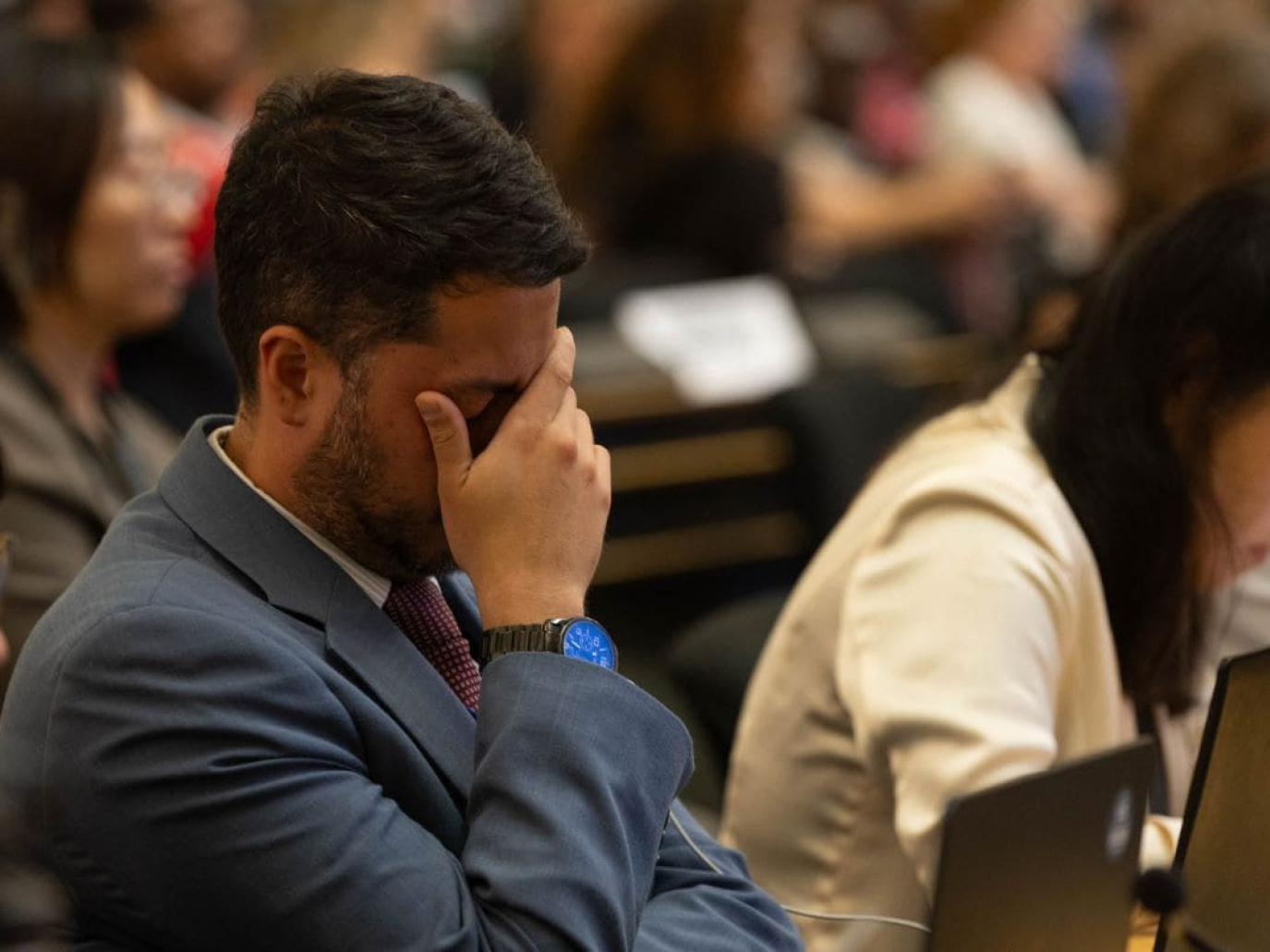
This article is also available in Italian / Questo articolo è disponibile anche in italiano
After a night of closed-door meetings and a day later than scheduled, the final plenary session of the extended fifth session of the Intergovernmental Negotiating Committee (INC-5.2) for a Global Plastics Treaty ended abruptly on Friday, August 15, at 9:12 a.m.
Despite $40 million already invested over the past three years of negotiations, the session was adjourned to a new, unspecified date and location. This conclusion leaves open the possibility of a further extended session (INC-5.3) but lacks clarity on the actual path forward, consistent with the procedural uncertainty that has characterized the negotiations since their inception.
During the more than ten days of negotiations, which began on August 5 in Geneva, Switzerland, delegates initially worked in four contact groups on the draft text agreed at INC-5.1 in Busan, South Korea, in December 2024. But by the middle of the second week of negotiations, no progress had been made. As in previous meetings, two groups of countries expressed opposing views on obligations to reduce plastic production, ban hazardous chemicals, and finance.
On one hand, the High Ambition Coalition (85 countries led by Rwanda and Norway, and including many African states and the European Union) and other ambitious countries, totalling over 100, want a treaty with global rules that regulate the entire life cycle of plastic.
On the other hand, a smaller group, the so-called Like-Minded Group (petrochemical countries led by Saudi Arabia, along with Iran, Iraq, India, Malaysia, Russia, Morocco, Uganda, Cuba, and Kazakhstan), wants a voluntary Global Plastics Treaty, with provisions addressing only waste management. The United States, which observers predict will never ratify the agreement, has positioned itself alongside them, and as expected, has opposed introducing production limits.
There is a third group of countries whose position has been more difficult to understand. These include Brazil, which nevertheless expressed support for the inclusion of human health in the treaty, and China, which stated in the final plenary session that "plastic pollution is much more complicated than we thought, as it affects the entire life cycle of plastic."
The texts proposed by the President did not reflect the opinion of the majority
Stating that he wanted to try to find an agreement that could be accepted unanimously, INC President Luis Vayas Valdivieso had taken the initiative to produce two drafts of the agreement. The first was released on August 13 at 2:50 PM. The text was described as "repulsive" by Juan Carlos Monterrey Gómez, Panama's delegate, who commented: "We will not betray future generations for the text as it stands."
The second was released on August 15 at 12:48 a.m. Observers considered it slightly better, but like the first text, it did not contain production reduction obligations or a section dedicated to human health. Both texts were, however, rejected by member states, bringing negotiations back to the Busan draft of INC-5.1.
But according to a CIEL analysis released shortly after the event, even if they had been approved, both texts would have represented a significant setback to the negotiations: “Both [drafts] were based on voluntary measures that failed to address the scale of the plastics crisis adequately and appealed to the demands of both petrostates and the petrochemical industry. And yet, over twelve days, Member States submitted dozens of text proposals that gained broad support from the majority of Member States. But rather than being folded into the text, they were cast aside for draft texts by the chair that appealed to the lowest common denominator, appeasing petrostates and the industry representatives who overwhelmed the negotiations.”
The Environmental Justice Foundation (EJF) estimated that the number of countries (ranging from 57 to 130) supporting various “ambitious” proposals (toxic-free reuse systems, production reduction, chemical control, voting mechanism at the Conference of the Parties, health article) is significantly higher than the number of countries opposing (between 20 and 25).
Derailing negotiations as a goal
For David Azoulay, director of the Environmental Health Program and head of delegation at the Center for International Environmental Law, INC-5.2 was "an abject failure" and negotiations will fail again in the future if the process does not change.
In a press statement he said: "We have clearly seen what many of us have known for some time - some countries did not come here to finalize a text, they came here to do the opposite: block any attempt at advancing a viable treaty. It’s impossible to find a common ground between those who are interested in protecting the status quo and the majority who are looking for a functional treaty that can be strengthened over time [...] Countries that want a treaty must now leave this process and form a treaty of the willing. And that process must include options for voting that deny the tyranny of consensus we have watched play out here.”
“Today, the international community was expected to celebrate the adoption of a new international treaty to end plastic pollution” Marcos OrellanaUN Special Rapporteur on Toxics and Human Rights, told Renewable Matter. "Instead, some countries that are captured by petrochemical and fossil fuel industries have blocked progress at the United Nations. All the while, the plastic scourge continues to aggravate the toxification of our planet.”
“Consensus has not been reached. The fault line between high-ambition and like-minded countries is deep, preventing us from leaving Geneva with a treaty. The disappointment is immense but must quickly give way to a tenfold determination to curb this pollution, which is inexorably advancing, with its share of victims” said to Renewable Matter Philippe Bolo, French parliamentary and member of the Interparliamentary coalition to end plastic pollution (ICEPP).
Global Plastics Treaty: An Avoidable Failure
"We now need to assess our options for the future, but let's make no mistake: the High Ambition Coalition remains steadfast in its commitment to ending plastic pollution and putting in place an effective treaty to this end as soon as possible” said Andreas Bjelland Eriksen, Minister of Climate and Environment of Norway, co- chair of the High Ambition, during the last plenary session, stressing that minimum conditions for a treaty must include, among other things, reducing plastic production and banning toxic chemicals, and a voting-based decision-making mechanism.
This is the opposite of what the Indian delegate stated in the plenary session, who instead reiterated that all decisions must be made by consensus and that reducing plastic production and banning chemicals cannot be included in the treaty. The Malaysian delegate added that the treaty must be "pragmatic" and must not impede developing countries' "sustainable development based on the use of their resources."
For Magnus Løvold of the Norwegian Academy of International Law, however, the failure of this week's Geneva session to conclude a Global Plastics Treaty “was not inevitable, but reflects a lack of courage, strategy and political imagination” and is due not only to the maneuvers to derail negotiations by Saudi Arabia and other Like- Minded Group countries but also to a lack of leadership among ambitious countries.
Løvold wrote on LinkedIn: “The rules of the negotiations are clear: “If all efforts to reach consensus have been exhausted and no agreement has been reached, decisions shall, as a last resort, be taken by a two-thirds majority of the representatives of Members who are present and voting.” This is not optional. It is a rule. Anyone watching the closing plenary on Friday morning could see that it wasn’t only efforts at achieving consensus that had been exhausted — the entire process had run out of steam. Yet the very countries that spent three years championing global rules on plastic pollution failed, when it mattered most, to enforce the rules already in place.”
Growing awareness of the impacts of plastic pollution
For Neil Tangri, Science and Policy Director of the Global Alliance for Incinerator Alternatives (GAIA), however, the three years of negotiations have produced “astonishing” results and now the “political will for an effective treaty is evident”.
“Plastic pollution, which until recently had been pigeonholed as a threat to marine wildlife, is now widely recognized as a major threat to the climate and human health,” Tangri wrote in an analysis released just at the end of INC-5.2, where he outlines possible alternative solutions to a new INC-5.3 meeting. “Industry is engaged, the public is outraged, and the media are paying attention. The call for reduced production has moved from the activist fringe to becoming a core demand of about 100 national governments.”
“Ambition won by not allowing a toothless text from being approved” Arpita Bhagat, Asia-Pacific Plastics Policy Officer, Global Alliance for Incinerator Alternatives (GAIA) told Renewable Matter. “The INC process has failed! We cannot waste any more time as the triple global crisis pushes us ever closer to catastrophe. Ambitious countries must consider alternative avenues toward an effective instrument.”
Global Plastics Treaty: invasion of lobbyists and ban on speech for right holders
The Global Alliance for Incinerator Alternatives (GAIA) also denounced the failure of the INC President and of the United Nations Environment Programme (UNEP) to prepare the ground for fair and effective negotiations. "A huge number of fossil fuel and petrochemical lobbyists have invaded the talks, while civil society has often been excluded [in both previous sessions and this one]" it wrote in a press release.
Observers were supposed to speak at the end of the plenary session, but only Eddy Frank Vásquez-Sánchez of Youth Plastic Action Network was able to do so: "[…] The current methods have proven insufficient. Inaction is not a neutral choice; it is a decision that affects us and future generations. We demand a methodological, transparent, and inclusive approach." But there was little inclusion.
John Thompson, head of the US delegation, initially took the floor asking the President of INC to talk about the path to follow in the negotiations, but when Vayas Valdivieso replied that he planned to listen to the observers and then adjourn the session to a later date, Thompson asked to close the session immediately (“Can we just gavel that through now? ”). Salman Alajmi, delegate of Kuwait, stepped in to support the instant adjournment of the session. Vayas Valdivieso complied, banging the gavel and denying the floor to a long list of observers and rights holders to make their statements.
The Scientists' Coalition for an Effective Plastics Treaty had also prepared a statement, but was prevented from making it: “The science is undeniable: plastic pollution harms people and the environment throughout its entire life cycle. We already know enough to justify urgent action. Ignoring the scientific evidence will only worsen plastics’ impacts on human health and the environment.”
Also read: Plastic credits, a false solution that legitimises waste colonialism
Cover: Haendel Sebastian Rodriguez, Coordinator for Environmental Affairs - Colombian Ministry of Foreign Affairs, picturber by IISD/ENB - Kiara Worth



